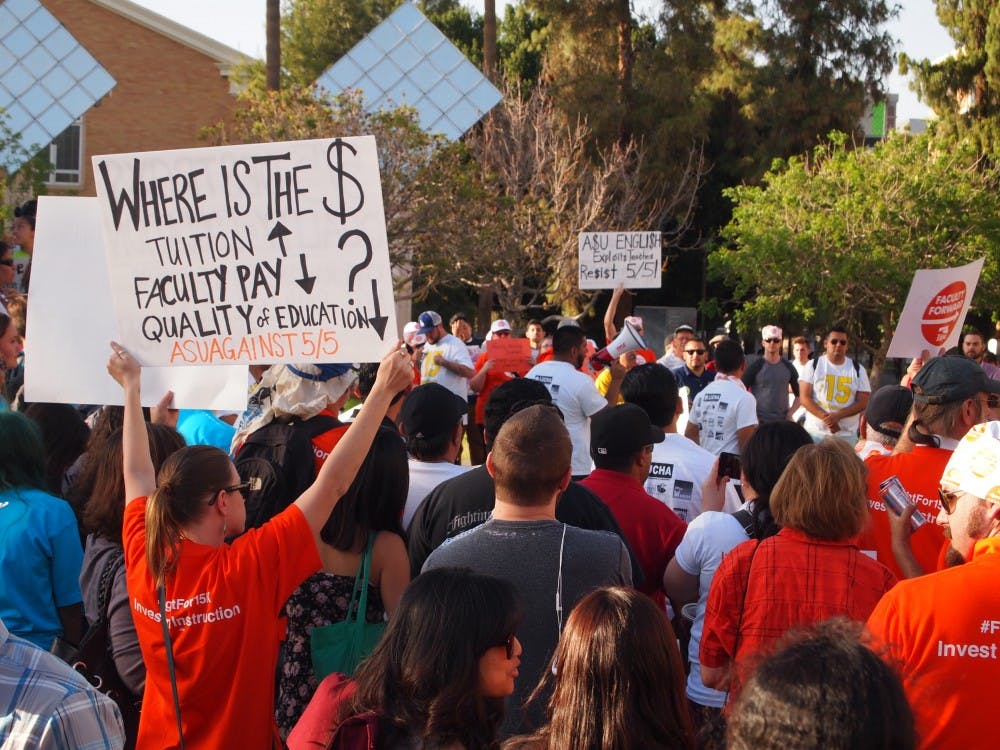Just in time for Tax Day, protesters marched through ASU’s Downtown and Tempe campuses Wednesday to demand a $15 minimum wage so labor and fast food workers may live comfortably with a 40-hour work week.
Fight for $15, the organization behind the international protests, began its movement in 2013 when 200 cooks and cashiers walked off their jobs to demand $15 an hour and union rights. This year, it expects rallies in nearly 100 cities.
Anabel Malconaco, a local Fight for $15 community organizer, said $15 wages affect college students because The Century Foundation discovered tuition inflation requires students earn more money to afford higher education.
“They adjusted the pay rate from the ‘70s, when someone could go to work over summer and then pay for their whole year’s tuition,” she said. “The equivalent to that now would be $15. And it’s possible. We’ve seen companies do it before.”
The goal is to make a higher minimum wage a reality in Arizona, Malconaco said.
“A lot of states have passed legislation for a higher minimum wage, but that’s still not enough,” she said. “Hopefully we can try to push something on a state level here in Arizona in the next year or so.”
However, the issues deal with more than just wage earnings. Juan Ramirez, a construction worker for the new Sandra Day O’Connor School of Law building, said his company, Great Western Erectors, treats its works unjustly.
“They do not give us water while we are working, and we have to buy our own security equipment in order to work,” he said. “We do not have proper insurance. Other companies provide training so that the workers are prepared for work, and this one doesn’t.”
Ramirez, who has gone on strike to protest his employer, said he and his fellow workers chose to rally on ASU’s campus to encourage student voices.
“It’s very important that we get student support, because we know that it’s with their money that these projects are run,” he said.“We need to get pressure from both sides so that President Crow hears the message loud and clear … that these (companies) should not be hired for their malpractices."
Social work sophomore Sarah Warne said she joined the protests because she believes students should be involved in the Center for Neighborhood Leadership, a grassroots organization in support of policies that benefit working families.
“This is a really good opportunity for students to come together to fight for something that they can believe in for their whole community,” she said. “On top of that, I think that people in the community deserve to be able to take care of their families, regardless of what jobs they have.”
Center for Neighborhood Leadership public policy director Viri Hernandez said she and many other Arizonan families can relate to these labor force issues.
“It hurts because I know that my dad works in this type of work,” she said. “These companies do this and treat workers this way because they feel like workers are not going to stand up for their rights, and they know that they get to fire them as their employer.”
Hernandez said students are the key to ending labor force malpractice at ASU.
“We don’t want ASU to support the type of company that is doing this,” she said. “We want students to say, ‘We’re not OK to stand in this building where workers were exploited.’”
Reach the reporter at aplante@asu.edu or follow her on Twitter @aimeenplante
Like The State Press on Facebook and follow @statepress on Twitter.




